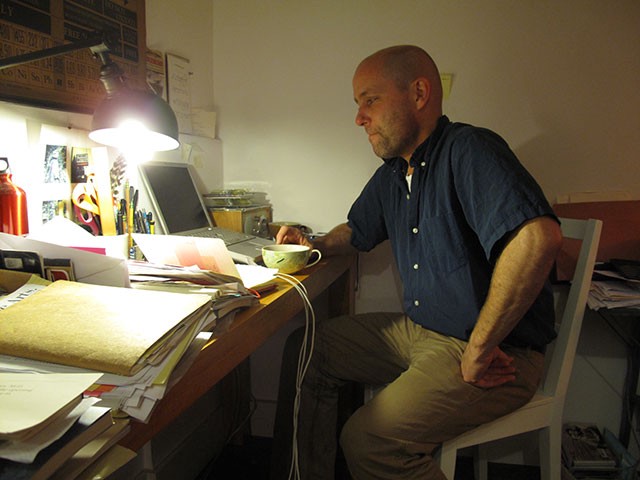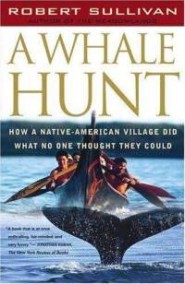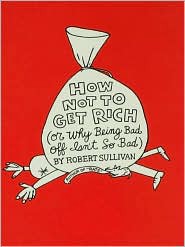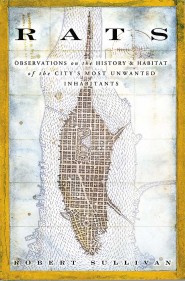How They Got There: A Conversation With Author Robert Sullivan
by Noah Davis

Robert Sullivan is almost certainly the only man in the country with a holiday greeting card from Anna Wintour on his fridge and a bestseller about rats on his resume. The former exists because of his 20-year gig as a contributing editor at Vogue; the latter comes as a result of the year he spent observing and chronicling the urban creatures as they lived their lives in an alley near Ground Zero.
In the Brooklyn apartment he shares with his preschool teacher wife and two teenage kids — one who recently took off for college with most of his father’s drum set in tow — Sullivan explained how a life spent crisscrossing the country and writing led to cards from Ms. Wintour, discussions about rat sex with Terri Gross, and an “accidental bestseller.”
In a couple paragraphs, how did you get here?
I was planning on being a musician, either a world-famous jazz drummer or a completely unknown session drummer. As a result, I ended up reviewing concerts in college, and then I ended up reviewing plays. I thought I should probably be a world-renowned playwright. I somehow got a job as a copyboy at The New York Times in college, thinking that would get me into more plays or something? It was amazing to be at the State Department taking down some comment for the bureau from the Secretary of State or else handing a letter to the Secretary of State for the bureau, and then seeing a version of that on the front page the next day. I had nothing to do with the writing, but I had taken the call from the dissident faction of some government, and the White House reporter used a line. I thought that was so cool.

I got a job in New Jersey out of college covering rural New Jersey and then urban New Jersey. I quit because I heard that freelance writers made a lot of money. That turned out to be bad information. So, I started painting houses, and I got a job fact-checking at Condé Nast Traveler. I would call Bulgaria at odd hours and ask them questions about hotels. It was really fun. Then, I got a job at a magazine called Seven Days. I went around the city writing fun stories. They closed, and I moved with my wife to Oregon where she’s from. I pretended I was a foreign correspondent, and I wrote for people in New York. I thought, “Oh, I should write a book about that place I used to hang out in,” which was the Meadowlands in New Jersey. I wrote another book about a whale hunt in the Pacific Northwest. Then, I wrote a couple more books. We moved back to New York City in 2000 or 2001. We moved up the river to Hastings-on-Hudson, where I think I wrote another book. We moved back to Brooklyn, and we’re here now, right?
You still play the drums?
I still play the drums. I have the snare drum right over there, but my son has most of the set at college.
Is he going to be the famous drummer?
You know, as far as kids and vocation, I just wake up every day and hope they don’t become a freelance writer. As I mentioned, I got bad information.
What would you tell your 20-year-old self? Don’t be a freelance writer?
You know, William Carlos Williams was a doctor and he wrote. Even [work in] insurance, like [Wallace] Stevens. And then you can write in your spare time.
Was there a moment where you thought you had made it as a writer?
No, I don’t think so. Usually I feel as if it’s not working out. That’s the drive for everything. I don’t think I’ve ever had that moment. I would like to have that moment. That would be good.

You wrote a book called How Not to Get Rich: Or Why Being Bad Off Isn’t So Bad. Personal philosophy?
There are roughly 600 copies right in the room next to us.
It was before the Great Recession, and clearly, everybody read it. They didn’t buy it. It seems as though they took it out of the library. The whole country took it out of the library, read it, and we went into a Great Recession.
[Laughs] No, it’s my favorite book as an object because I did it with a friend, Scott Menchin. He’s an amazing artist. We both really like Ben Shahn, and we were both really into this idea in the ’40s, ’50s, ’60s where artists would do a book together. There’s a book by E.B. White and James Thurber called Is Sex Necessary? I wondered why people weren’t doing more of those types of books. At the same time, I had done a number of books and everything kind of worked out, but there’s never enough: college, rent, and all these things you have to pay for. And yet, to put it in a corny way, there’s so much great stuff that has happened to you. It felt like a good time to write about how things are really good even though they never work out on a financial end. The best thing about that book is the cover and the pictures. The words are secondary, but I’m so proud to be the secondary part of a primarily good project.
How much do you write every day?
I work on a lot of magazine pieces. I write a lot for Vogue. I’m probably doing something for some piece for them every day. Right now, I’m doing a story for New York that’s taking me a long time. I think I wrote 1,000 bad words today for them that will probably have to be re-written. I have this other idea for this other thing that’s probably not going to work out. This morning, early, I wrote 1,200 words for that. On Sunday, I was planning to write a lot, but I did not write anything. I think I made notes about what I was going to write, but today I can’t find them. If I have a big story due and it’s that week, then that might be a 5,000-word piece. But, simultaneously, in my “free-hyphen-lance” life, I have to be working on a book at the same time otherwise I die. There’s the Woody Allen line about how a relationship is like a shark and it has to keep moving. Someone recently told me that when sharks mature, they don’t have to keep moving. So, I don’t know. Do I have to not move anymore? I don’t know. Everything is a big question mark for me.
Do you have a formal strategy? Something like your wife go to work and the kid(s) go to school and you start working?
The idea is to get up as early as you can, because nobody calls early. Five and six in the morning, nobody calls.
My formal strategy is some days you just have to go running. You have to give yourself a day off. New York is so expensive and even when you have a cheap apartment, it’s still expensive. It’s expensive to have kids, but if you don’t have kids, it’s expensive because you’re here or there. There’s so much pressure to figure out a way that you forget how valuable days are where you just take the afternoon off and are in New York.
My wife and I went to the American Academy of Artists across from the Met. I’d never ever been there. There’s a room in there that’s from the early 1900s. It has wood panels and high ceilings. All the walls are covered with paintings. And they are American paintings. I should be in that room every day. I would be a much more productive person if I spent six out of eight hours every day in that room. I can’t imagine if I hadn’t gone in that room.
A reviewer called you “a mischievous reporter on the universe.” Is that a fair description?
Yeah, that’s a good one. I should probably stop after that and not write anything else. That’s perfect.

You wrote a bestseller about rats. That’s pretty awesome.
Yeah, it was an accidental bestseller. That’s important to remember.
I think they all are, aren’t they?
Rats spelled backwards is “star.” So, that’s underneath the reason why people bought it. I also used to joke that a lot of people would come to readings and all of a sudden they would leave because they thought it said “cats.”
Why did you write Rats?
I had been on this whale hunt, and I had been living up in the Olympic Peninsula. I had been at a reservation with this Native American tribe. They were hunting a whale, and many people were upset with them. They said, “You don’t want to hunt a whale. You’re Native Americans, and you love nature.” At some point during this time, there were a lot of animal-rights groups there. I was with them and they mentioned that they had rats at their office. They said they got an exterminator, and I asked if they exterminated the rats. They had, and I thought, “That’s the creature that’s the line in the sand as far as what’s natural and what’s not natural.” I love opposites, and I love reverses. I wanted to write a book about these creatures that are not considered natural but write a nature book about them.
The great thing is that this creature is completely associated in its living habits with humans. You get into this excellent place where you can secretly be talking about something else when you’re talking about rats. Of course, I was talking about humans and crowds and cities. That’s all I want to do. I love when you’re writing about something, but you’re also writing about something else. That’s so hard to get there, but it’s always where I’m hoping to be. Maybe twice in my life I’ve been there.
Any good rat stories?
Actually, I just heard a rat story that falls into a category of rat stories that are new to me. A guy told me he saw a rat in an apartment, his mother’s apartment. He set a trap, killed it, and put it into a garbage bag. He took the bag outside and dropped it into the garbage can. As he was walking back inside, he heard a sound, a scratching, and then saw the rat that was killed leaving the can. It’s a rat resurrection story, a rat Lazarus! Amazing.
And then about a week or so ago I was running across the Brooklyn Bridge, at about five thirty in the morning, in the dark, and I saw something to my right on the ground in my peripheral vision and then felt a weight on my foot. It was as if I were suddenly carrying something on my foot, in the instep, and then just as suddenly the weight was gone and the gray blur I had seen to my right was out in front of me and then quickly dashing off to my left — a rat that I had accidentally footed. For me, the most amazing part was that I had not interrupted the rat in his straight line across the bridge’s path. I did not cause him to deviate. I shouted an obscenity because it scared the crap out of me.
I assume you’re excited about writing that book. And I assume your wife is at least pretending she’s excited about it. And maybe some friends, but what are your expectations? “I’d like to sell 1,000 copies?” “I’d like to be done with it?” Does that even cross your mind?
Done is a big thing.
When you choose a topic, you think to yourself, “Am I going to be able to live with this idea for a long time?”
In a way, I have all the stories. I’m trying to finish the three or four ideas I’ve had for a long time. This book about the Revolutionary War, I’ve been nuts about Colonial encampments. Not in a big way, but I remember covering the reenactment of the Battle of Brooklyn in 2001.
When I went to write Rats, it’s something I’ve been thinking about. I love these places where rats are. And I wonder to myself if I could write a whole book about rats. It would be kind of cool because you’d get to go to some amazing places. There are some pretty interesting landlord tenant disputes about rats. As far as editors go, I’m just trying to keep it interesting. I’m thinking of a couple of friends and my wife. Would she want to read this sentence? Would Dave down the street be at all interested in this? And if I think they would, then it’s good.
Still, I imagine talking to Terry Gross about rat sex on NPR was not somewhere that you ever imagined being.
You don’t meet her when you’re talking to her. And I think that’s probably better because I carried a stuffed rat around with me. But yeah, I think that when you have the most fun, when you’re the most psyched, then it’s not completely surprising that someone else would pick it up as well.
How do you keep that excitement?
Drinking. Mostly I’m drunk. [Laughs] No, I have sort of a problem where I’m over-caffeinated, even without caffeine. Many people ask my family how they can stand it. If you look around, my wife is a teacher and an artist. The Revolutionary War is all over the house. All these quilts [that she made] are all based on ideas in the book. We live with ideas, so I get to see what I’m thinking in a way that I could never imagine because she’ll make a quilt.
It sounds incredibly stupid, but it seems as though it’s so easy to dig around and find cool stuff about so many topics. There’s no shortage. The sky has been amazing for the past two weeks with the fall, the season changing, and the mist coming from Jersey City. I walked down to the water. It’s all about finding this year or this two-year’s saddle that we’re going to put on it. It’s all about gearing up to march into the world with a slightly different outfit, but the same direction.
Do you have a skill set that suits that type of job?
I think a better question is, “Do I have a skill set?” [Laughs] I don’t think I have a skill set. I think that’s why I do this.
The Thoreau You Don’t Know. Who came up with that title?
I’m sure it was me under duress. I think it was my editor, too. Titles are really hard. I like really short titles. I like Brown, Black, Rats. Dead is really the title I’m working for. [Laughs] As much as that’s a joke, I think that really might be. Rats is pretty close to Dead. Swamp is pretty close to Dead.
Do you have a hard time explaining your job?
My son jokes that everybody goes away, and I’m home with the silk robe, cigar, champagne, big slippers. And that’s what I do all day.
It’s not fair for me to complain. The really, really, really, really great thing about my job is that I can go out and walk my wife to work. But a goal of mine when I became freelance, which was when Seven Days closed, was that I would go to movies during the day because they are cheaper. I’m not sure I’ve gone once.
Recently, someone asked me if I wanted to go and I thought, “This is it. Today is going.” I was getting kind of desperate. Are we still going? And then all of a sudden, he says, “I don’t think I’m going to make it.” “What do you mean?” And we didn’t go.
In Brendan Gill’s book, Here At The New Yorker, there was a page that I used to have when I had a drawer in my desk. It was the definition of ‘freelance.’ It was: “Free to starve.”
But I don’t know if I’ve made that goal.
Who should I talk to next?
Marty Skoble. He is a poet and a dancer (or was a dancer), and is mostly someone I think of as a poetry teacher, an amazing poetry teacher. I think the guy is amazing. An amazing teacher, an amazing teacher of poetry. Teaches little kids, big kids, teaches poets you have heard of. Once a bunch of high school boys walked into a poetry reading he put on, having won their game, and proceeded to read their poems — a poem in itself.
Previously:
Noah Davis is frequently lost.
